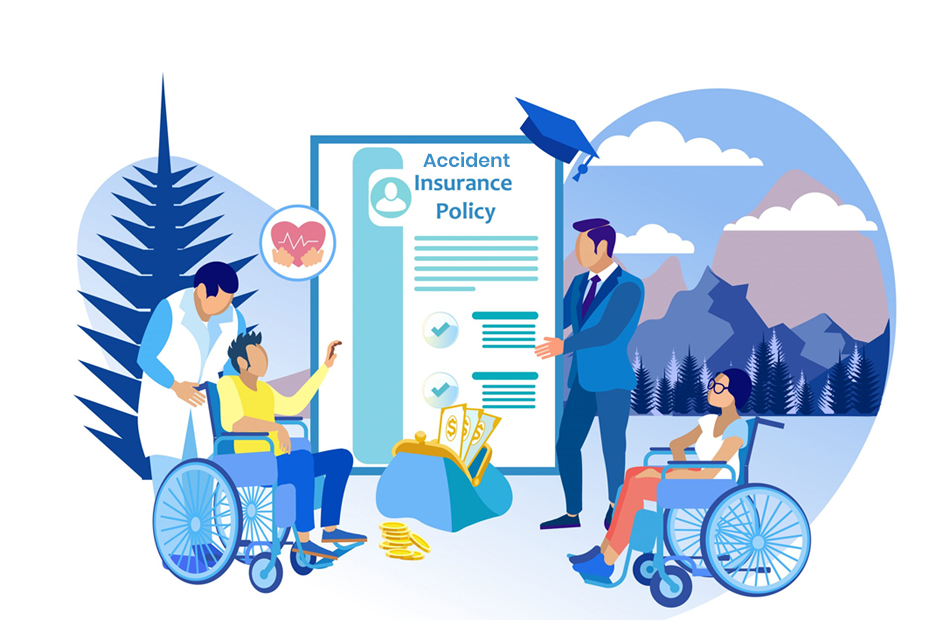
People often struggle with deciding which insurance plan to get to safeguard their insurance portfolio. Among other questions, many individuals are perplexed by the distinction between personal accident and term insurance and whether it is beneficial to invest in both or either. In this post, we’ll discuss the differences between personal accident insurance and term insurance.
What is term insurance?
A standard-term insurance plan is an essential component of your financial strategy. A term insurance plan is a must-have for protecting your loved ones’ cash and monetary future. It is an excellent addition to any investing portfolio. A classic term insurance plan protects against life’s uncertainties by allowing the policyholder’s nominee(s) to receive the principal plan benefits, i.e., the amount guaranteed, in the case of the policyholder’s death within the plan period.
However, if the policyholder lives out the policy term, there are no advantages, i.e., no maturity proceeds. This provision transforms a term insurance plan into a very basic version of a pure life insurance scheme, with defined terms and conditions for the coverage supplied. There are exceptions, however, since many insurance companies include a return of premium provision, under which a policyholder is entitled to recover the premiums paid until the policy’s term expires.
What is personal accident insurance?
Personal accident insurance, on the other hand, is a restricted kind of coverage option in which the policyholder’s nominee(s) are only eligible to benefit if the policyholder dies or becomes permanently disabled as a result of an accident. One of the most fundamental differences between the two is that personal accident insurance excludes natural causes. A standard term insurance plan includes terms that protect against all types of deaths, whether natural or accidental, while personal accident insurance only covers deaths caused by accidents and excludes natural causes. This is when the usual restriction of a personal accident insurance policy kicks in.
Personal accident insurance carriers give the whole amount promised on the chance of the policyholder being involved in an accident that significantly restricts the body’s mobility or makes the person entirely incapacitated, as well as coverage for death as a result of the accident. In any event, the policyholder’s nominee(s) are eligible to receive the amount promised. Despite being directly related to an unintentional incident, a term insurance policy already covers this characteristic. As a result, a term insurance plan is far more comprehensive than a personal accident plan, and conventional term insurance is more affordable when compared to other forms of insurance.
What are the types of term insurance plans?
In general, insurers provide a variety of term insurance plans, allowing customers to choose one that best meets their requirements. Some popular term insurance options available in India are described below:
1. Level-Term Insurance Plan
The most common form of term insurance policy is a level term plan, which gives a set guaranteed payment to the policyholder’s nominee in the event of the covered individual’s sudden death. However, if the insured individual survives the insurance period, no compensation will be provided. This insurance plan has fair rates and is based on the insured’s age, policy term, lifestyle behaviours, and manner of premium payment.
2. Increasing the Term Insurance Plan
Expanding term insurance raises the money insured by a certain percentage each year. Furthermore, when the amount of insurance money increases, so do the policy’s premium rates.
3. Decreasing Term Insurance Plan
Specifically, a declining-term insurance policy is the inverse of an expanding-term insurance policy. According to this policy, the amount of the sum promised decreases by a certain percentage on an annual basis. As a consequence, the policy’s premium rate gradually decreases.
4. Premium-Returning Term Insurance Plan
The basic term life insurance policy only covers death payouts, not survivor benefits. However, if term insurance is combined with a premium return, an insured person will get the whole premium paid as survival or maturity benefits if they survive to the end of the term.
What are the types of personal accident insurance plans?
Personal accident insurance policies are offered in three types, as listed below:
-
Individual Accident Insurance.
Individual accident insurance policies provide compensation for any unforeseeable unintentional bodily harm, temporary or permanent disability, loss of vision or limbs, or even accidental death. - Group Accident Insurance.
Group accident insurance is another kind of personal accident insurance. In general, employers of numerous companies use this insurance policy to offer coverage for their staff. This insurance plan offers a reduction in premium amounts dependent on group size.Group accident insurance is a wonderful incentive for small businesses since it is reasonably priced. This insurance policy, however, is less efficient than an individual plan since it offers fewer benefits.
3. Child Personal Accident Coverage
Children are often prone to unanticipated mishaps. A kid’s personal accident policy ensures that your youngster is adequately covered against accidents and injuries. This plan includes a large quantity of insurance and covers both medical expenditures and temporary or permanent disability.
What sets them apart?
As previously stated, personal accident insurance only covers fatalities brought on by accidents. On the other hand, term insurance provides enough coverage in the event of an accident or other natural cause.
However, the death benefits available via term insurance are restricted. Personal accident insurance covers both medical expenditures and disability resulting from the accident. In the absence of income loss as a result of the catastrophe, the compensation received as part of personal accident insurance may assist the policyholder in meeting his or her essential financial requirements. This is not included in the term plan.
Following are the key differences between personal accident insurance and term insurance policies:
| Aspects | Term Insurance Plan | Personal Accident Insurance Plan |
| Tenure | A term insurance policy can last for 10 years, 20 years, or more. | The tenure of a personal accident insurance policy is one year. |
| Renewals | There is no need to renew a term insurance plan. | Personal accident insurance plans must be renewed every year for continued coverage. |
| Coverage Amount | The maximum amount of coverage is up to 20 times your yearly income. | The maximum coverage amount is usually 10 times your yearly income. |
| Disability Cover | The basic term plan does not include any disability cover, but riders like accidental and disability covers can be added. | The major coverages of a personal accident insurance plan are accidental death and disability. |
| Benefit Distribution Mode | In a term insurance plan, the sum assured is claimed as a monthly income, a lump sum, or a combination of both. | In a personal accident coverage plan, the sum assured is claimed as a lump sum amount only. |
| Risk Factor | Term insurance plans provide coverage against natural death. That means, that if the life insured dies in an accident, no compensation will be given under the basic term plan. | A personal accident insurance policy offers coverage only for accidental death or disability. |
| Compensation | The beneficiary gets the insurance money in the event of the insured individual’s death. | In a personal accident insurance plan, if an insured person gets injured in an accident, the medical treatment charges can be claimed as per the policy. |
Which one should you invest in?
Although term insurance and personal accident insurance policies seem to be identical, there are significant variances.
- Term insurance covers both accidents and natural death, whereas personal accident insurance is just for accidents.
- In the event of the policyholder’s death, term insurance pays out death payments to his or her nominees. Personal accident insurance provides compensation to the policyholder’s family only if the insured dies in an accident.
- Term plans are cheaper and might provide financial security for your family.
Although both plans provide individual advantages, term insurance is the best choice.
Investing in suitable long-term insurance coverage should be your top priority for securing your family’s future. However, if you want to safeguard your whole life insurance portfolio, you may get supplementary personal accident coverage. This is primarily because it provides beneficial protection against accident-related incapacity, which your life insurance policy does not cover. Your term insurance will not cover temporary complete disability or partial permanent disablement, nor will it pay for medical expenditures resulting from your accident. Also, if you work in a high-risk job, you may consider combining your life insurance policy with a permanent accident insurance policy to provide enough coverage at an affordable rate.
Case Study:
Rohit, who worked at a transportation business, was involved in an accident. He lost a limb. The hospitalisation cost almost Rs. 2 lakhs. In such a devastating state, his family has no other income. Rohit is unable to work for an extended period because of his persistent partial handicap. In such a condition, there are two possibilities:
Scenario 1: Rohit has personal accident coverage. In such a case, he will receive a 50% or 100% payout of the sum insured, depending on the terms of the policy. He will get compensation for part of his lost income. Accidental insurance will offer coverage in such a situation, ensuring the insured’s financial security.
Scenario 2: Rohit has life insurance coverage. In this situation, he will not get compensation for permanent disability since term life insurance only covers the death payment. He is responsible for covering all costs himself. such a difficult time, all of his money will be lost.
Conclusion
Investing in life insurance is a prudent move, and it should be your top priority if you want to offer financial security to your family. However, if you are more concerned with building your life insurance portfolio while still providing comprehensive coverage, purchasing a personal accident policy separately might be a wise choice. The reason for this is that personal accident insurance only covers injuries and impairments caused by accidents. Term insurance does not cover disabilities caused by accidents.
So, it is preferable to get a term insurance plan to protect your family’s financial stability and a standalone personal accident than a rider since the coverage supplied is more comprehensive.
Remember that a personal accident policy will cover any additional expenses that fall beyond the scope of your life and health insurance plans.
Accidents are inescapable, as is death. While an injury might impede your capacity to work, death can put your family in financial distress owing to a lack of income. When you can take all the precautions to avoid accidents by purchasing a personal accident policy, you can face the obstacles that life throws at you by investing in excellent term life insurance!
